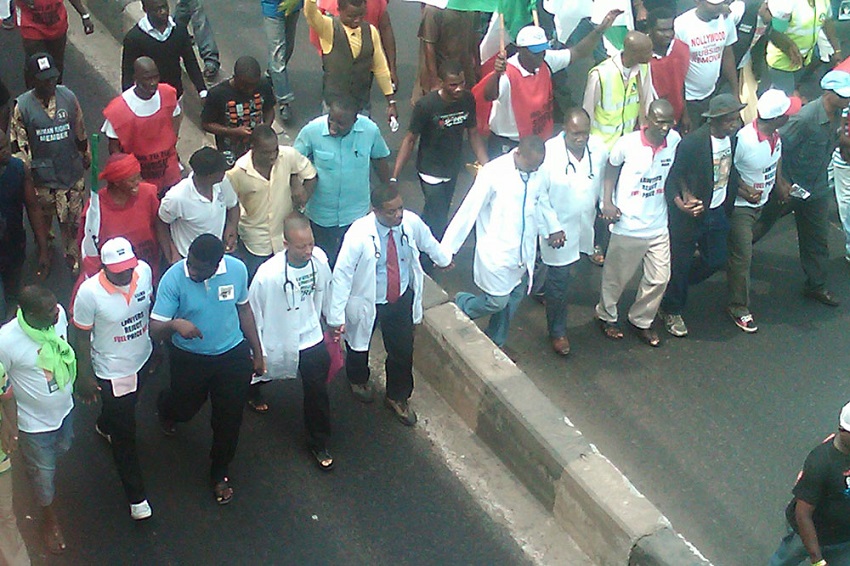Just imagine your loved one suddenly fell ill, and you had to rush them to a government hospital nearby, only to find the emergency ward locked, the lights dim, and a guard casually telling you, “Doctors are on strike.” In that moment, every statistic about Nigeria’s broken health system becomes personal. And it raises the question: how did we get to a place where the very people meant to save lives are forced to abandon the hospital corridors in protest?
Why This Strike Matters Now
Nigeria’s public hospitals are on the edge of collapse. In early September 2025, the Nigerian Association of Resident Doctors (NARD) declared a five-day nationwide strike over unpaid salaries, delayed training funds, and poor working conditions. Though the strike was suspended after two days, doctors have given the Federal Government just two weeks to fulfill its promises or face a possible full-scale shutdown.
Strikes in the health sector aren’t new, but this one matters more as it comes at a time when inflation is biting harder, the cost of living is climbing and the decision to add taxes to petroleum products is still being debated by the government.

Ordinary Nigerians Feel the Impact First
For everyday Nigerians, the strike isn’t an abstract headline. It’s the pregnant woman in Kaduna turned away from antenatal care. Or the child with malaria in Ibadan whose father had to scramble for a private clinic he couldn’t really afford. Even the chronic patient in Lagos rationing medication because checkups were suddenly canceled.
On social media, the mood was raw. Tweets and TikToks painted a picture of helplessness, with people lamenting the whole situation. The frustration is universal because almost everyone has a story of waiting for hours in a crowded hospital only to face disappointment.
Why Doctors Are Fed Up
At the heart of the strike are broken promises and systemic neglect. Doctors say the government owes them months of arrears, allowances, and even basic residency training funds. Some hospitals still have dilapidated call rooms, power shortages, and not enough staff to handle patient load.
And then there’s the bureaucracy: membership certificates from Nigeria’s postgraduate medical colleges are delayed, while foreign certifications are downgraded by local regulators. Young doctors feel undervalued, overworked, and underpaid. Many quietly plot their exit routes to Canada, the United Kingdom (UK), or anywhere else that will treat them better.
As we can see, the issue is not just why doctors are striking, but why Nigeria keeps pushing its healers to the edge.

The Hidden Opportunity in the Crisis
As disruptive as strikes are, they shine a harsh light on what’s broken. They also create a chance to demand reform instead of patch-work fixes.
Imagine if the government actually invested consistently in the Medical Residency Training Fund, cleared arrears without excuses, and upgraded hospital infrastructure. Imagine if young doctors didn’t see emigration as their only career plan. Nigeria could not only retain its talent but also start building a health system that works for ordinary people, not just the wealthy who can afford private care.
There are glimpses of what’s possible: some states that made early investments in health facilities have reduced strike disruptions. Other countries in Africa have turned crises around with transparent salary structures, better funding models, and partnerships with teaching hospitals. Nigeria can too.
A Way Forward
So what can be done?
- For Government: Pay doctors what is owed, without delays. Stop treating healthcare like an optional budget line.
- For Hospitals: Improve working conditions. Power supply, equipment, and call rooms aren’t luxuries, they’re essentials!
- For Young Nigerians: Whether in medical school or not, demand accountability. Healthcare is a collective right, and when it fails, we all pay the price.
- For Civil Society & Media: Keep the pressure on. Strikes shouldn’t fade from the headlines until real solutions are in place.
The Real Question for Nigeria
Nigeria has two weeks to prove it values its doctors, and by extension, its people. If the promises are broken yet again, the strike will return, and the silent emergency in our hospitals will get louder.
So here’s the challenge: will we keep pretending this is normal, or will we demand a healthcare system that doesn’t collapse every time doctors ask for what they’re owed?
Because sickness doesn’t wait, and neither should we.
For more stories, visit our website and follow us @Insidesuccessng for more updates and info. Subscribe to ISN for exclusive content, expert-led events, job opportunities, and more.


Leave a Reply